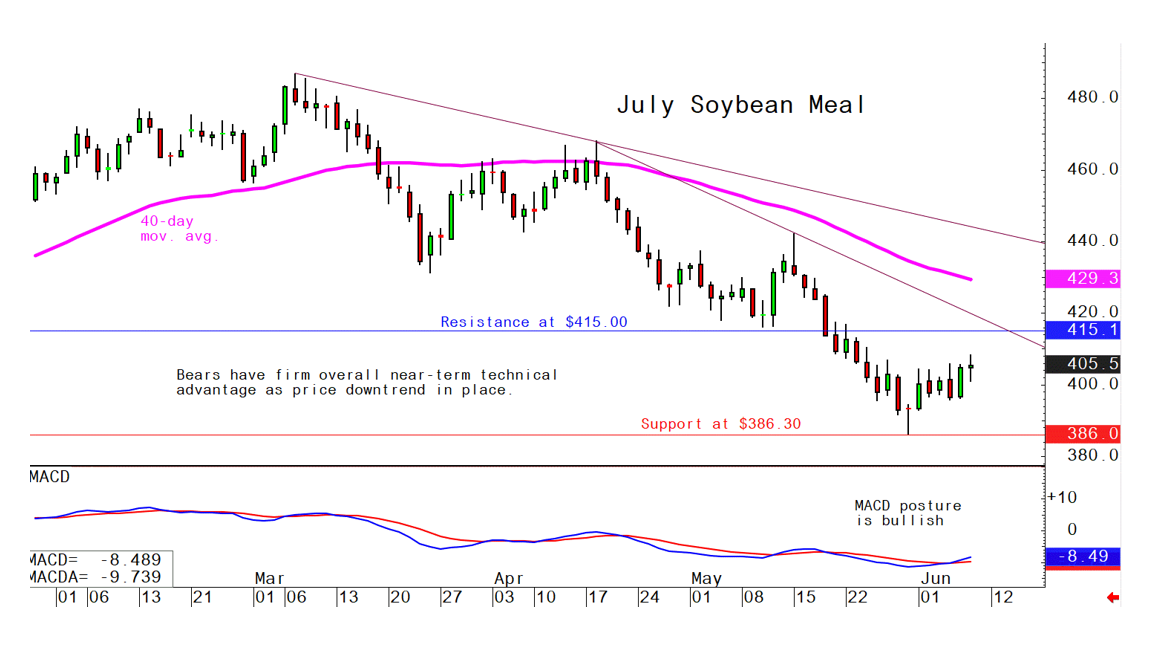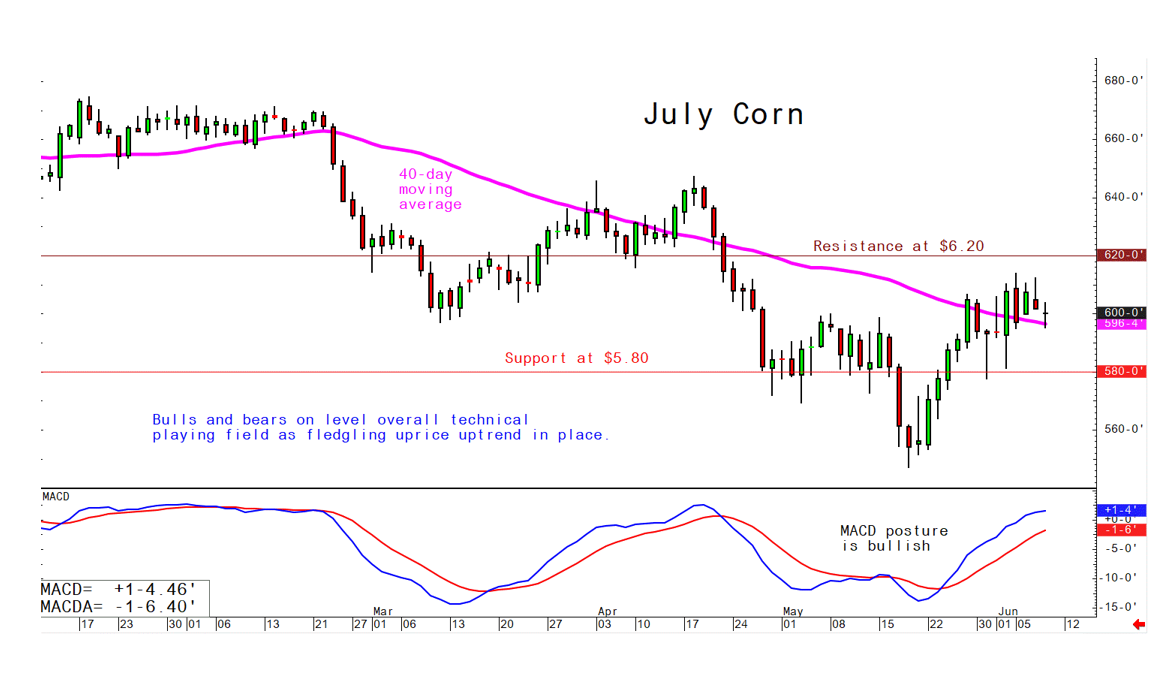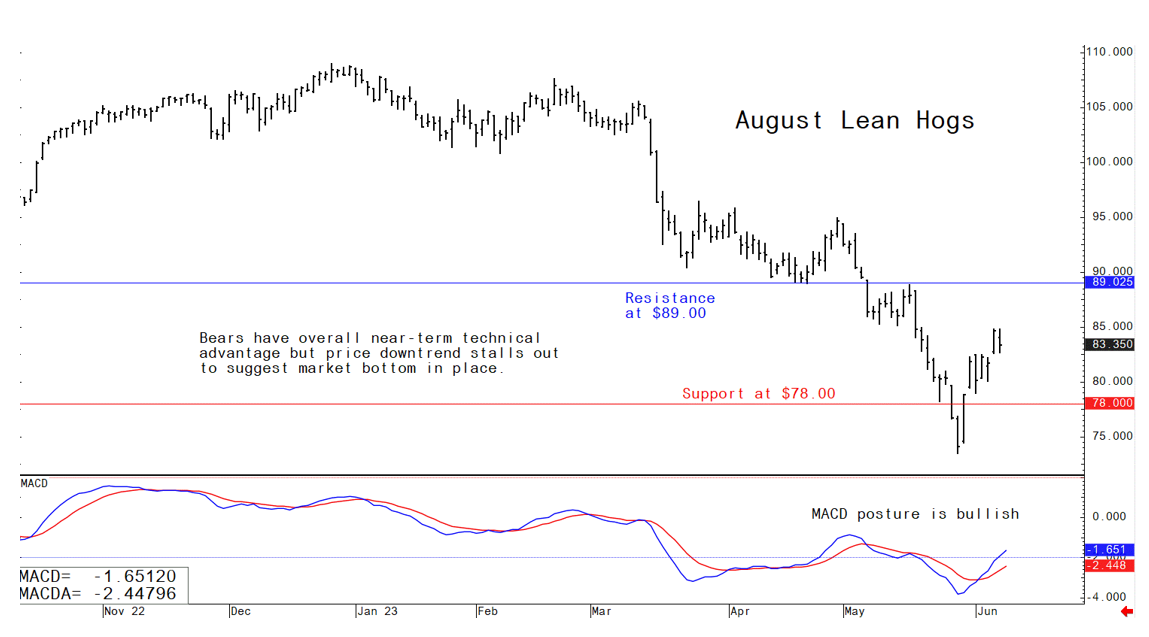



Pig outlook: Still signs of market bottom in lean hog futures
Analyst Jim Wyckoff shares update on global swine industryLean hog futures have rebounded from the May lows and there are early clues that a market bottom is in place. The CME cash hog index has lagged futures gains, however. The June contract remains well above cash prices. Tuesday’s preliminary CME cash hog quote of $83.04 is $1.17 higher than Monday’s confirmed 69-cent rise to $81.86. The cash and futures prices should be supported in the near term as grocers are purchasing product for upcoming Father’s Day and Independence Day specials. Pork features in the coming weeks may provide the needed demand to lift hog/pork prices in the interim as beef prices continue to soar. Soaring cattle futures prices recently should also continue to support a rebound in lean hog futures.
Weekly U.S. pork export sales
U.S. Pork: Net sales of 25,500 MT for 2023 were up 13 percent from the previous week, but down 11 percent from the prior 4-week average. Increases primarily for Mexico (9,100 MT, including decreases of 800 MT), China (8,100 MT, including decreases of 300 MT), Japan (3,200 MT, including decreases of 300 MT), South Korea (2,000 MT, including decreases of 800 MT), and Colombia (1,500 MT, including decreases of 100 MT), were offset by reductions for Nicaragua (500 MT), Australia (500 MT), and Taiwan (100 MT). Exports of 25,100 MT were down 26 percent from the previous week and 31 percent from the prior 4-week average. The destinations were primarily to Mexico (7,400 MT), Japan (4,000 MT), China (3,900 MT), South Korea (2,600 MT), and Canada (1,500 MT).
Latest USDA and other news regarding the global pork industry
First ASF vaccine nearing approval in Vietnam
Vaccines against African swine fever (ASF) being tested in Vietnam are close to approval, global and U.S. veterinary officials said. Two vaccines co-developed by U.S. scientists being tested in large pilot program by Vietnamese companies are showing “very promising” results, Gregorio Torres, head of the science department at the World Organization for Animal Health (WOAH), told Reuters. The next step will be nationwide authorization in Vietnam, the first ever for an African swine fever vaccine, and possible sales overseas. USDA researchers have reviewed the results of one of the vaccines, NAVET-ASFVAC, and reported “no safety issues.” USDA has not yet reviewed the data for the second vaccine, AVAC ASF LIVE.
Hormel Foods has invested significantly in transitioning their pig farms to comply with California's Proposition 12 standards
The aim is to eliminate sow gestation stalls from the state's pork supply chains. While the exact cost of the endeavor has not been disclosed, Hormel CEO Jim Snee expects the company to start recuperating those costs soon. They have already been Prop 12-compliant for part of their pork supply since January 2022.
Germany’s pork consumption per capita has plunged in past years
German hog producers and meat processors are withdrawing amid hurdles. Bloomberg reports that the northwest German town of Vörden's meat plant, known for producing the beloved bear-shaped cold cut Bärchenwurst, has announced its closure due to rising production costs and waning pork demand. This reflects the challenges faced by Germany's pork industry, which is grappling with decreased demand following the African Swine Fever outbreak, along with economic constraints and stricter animal welfare provisions.
Consumption figures reveal that the average German ate 40 kilograms (88.2 pounds) of pork per year in 2007, dropping to 29 kilograms (63.9 pounds) in 2022. With changing trends in diet and young Germans favoring other types of food, Germany's pork industry is fighting to stay relevant in the rapidly shifting landscape. A higher percentage of the population is now vegetarian or "flexitarian," while environmental and health concerns are shaping consumers' choices away from meat-intensive diets.
California Department of Agriculture (CDFA) increasing education and outreach efforts regarding Proposition 12
Following the U.S. Supreme Court's decision to uphold the program, CDFA states in a Q&A that their priority lies in registering pork distributors as they gear up for full implementation by January 1, 2024. This will involve the introduction of third-party certification to ensure compliance. The CDFA acknowledges that some products procured before July 1, 2023, will still be in circulation and that there will be a transition period throughout the rest of the year. The department intends to focus its limited resources on ensuring all required distributors are registered, crediting third-party certifying agents to offer more options to producers and distributors, and certifying these producers and distributors. So far, the CDFA has released a list of 587 registered distributors under the initiative and currently lists five accredited certifying agents located in Missouri, Arkansas, Iowa, Virginia, and Michigan. To facilitate this process, the agency has announced it will be hosting three webinars this month for various parts of the food system, ahead of the July 1 enforcement date.
The next week’s likely high-low price trading ranges:
- August lean hog futures--$78.00 to $88.00 and with a sideways-higher bias
- July soybean meal futures--$386.30 to $415.00, and with a sideways-higher bias
- July corn futures--$5.85 to $6.15 and a sideways-higher bias
Latest analytical daily charts lean hog, soybean meal and corn futures










